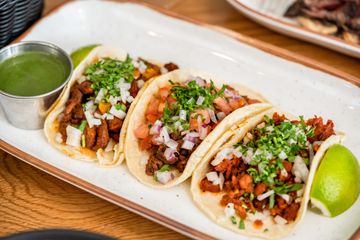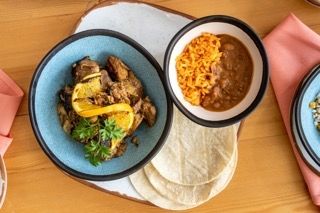Join foodies for happy hour featuring margaritas and more
Is Mexican Food Healthy? Unloading the Nutritional Conveniences of Conventional Components
The question of whether Mexican food is healthy and balanced welcomes an expedition of its typical active ingredients. Beans and corn offer as foundational staples, abundant in healthy protein and fiber. Avocados supply helpful fats, while different natural herbs and spices add taste and health and wellness advantages - lunch and dinner. With each other, these parts produce a tapestry of nourishment. Nonetheless, the healthiness of Mexican food commonly depends on prep work techniques and part dimensions. What function do these factors play in identifying its general nutritional value?
The Power of Beans: Healthy Protein and Fiber-Rich Staples
Usually overlooked, beans offer as a keystone of Mexican cuisine, using a wide range of dietary benefits. Rich in healthy protein, they are a superb plant-based option for those seeking to meet their nutritional protein needs. This high healthy protein material sustains muscle mass fixing and development, making beans invaluable for both vegetarians and meat-eaters alike. In addition, beans are an exceptional source of dietary fiber, which helps in digestion and advertises a sensation of volume, potentially aiding with weight monitoring.
The range of beans made use of in Mexican dishes, such as black beans, pinto beans, and kidney beans, adds to a diverse taste account and can enhance meals nutritionally. Furthermore, beans are low in fat and include essential nutrients, consisting of folate, magnesium, and iron. With each other, these attributes make beans a crucial component, providing both nutrition and nutrition in typical Mexican fare.

Corn: a Versatile Grain With Nutritional Advantages
Corn sticks out as a flexible grain essential to Mexican food, celebrated not just for its culinary applications however also for its outstanding dietary account. As a main component in dishes like tortillas, tamales, and pozole, corn offers necessary nutrients that contribute to a balanced diet. Rich in carbs, it serves as a substantial power resource, while additionally being low in fat, making it a beneficial alternative for different nutritional demands.
Furthermore, corn is an excellent source of dietary fiber, which helps in digestion and promotes satiation. It has substantial quantities of vitamins such as B-complex vitamins, which are crucial for basal metabolism. The presence of antioxidants, especially carotenoids, adds to overall wellness by decreasing oxidative stress and anxiety. Additionally, corn is gluten-free, accommodating those with gluten level of sensitivities. Generally, the nutritional advantages of corn emphasize its significance in conventional Mexican food and its duty in a healthy diet plan.
Avocados: Healthy And Balanced Fats and Nutrients in Every Bite
Avocados play a considerable role in Mexican cuisine, matching meals with their velvety appearance and rich taste. Past their culinary charm, avocados are commemorated for their impressive dietary profile. They are a rich source of healthy monounsaturated fats, which can help lower bad cholesterol levels and support heart wellness. In addition, avocados are packed with essential minerals and vitamins, including potassium, vitamin E, and B vitamins, adding to overall health.
The high fiber content in avocados aids food digestion and advertises satiety, making them a valuable enhancement to any kind of meal. Their distinct nutrient composition can also support skin health and supply anti-inflammatory advantages. Including avocados into traditional Mexican dishes or enjoying them as a standalone snack can improve both taste and nourishment, demonstrating why they are a precious staple in Mexican food. On the whole, avocados use a delicious way to enjoy healthy and balanced fats and important nutrients in every bite.

Flavors and Natural Herbs: Flavorful Health And Wellness Boosters
While enjoying the abundant tastes of Mexican food, one can not neglect the essential function that spices and natural herbs play in improving both preference and health and wellness. Components such as oregano, chili, and cilantro peppers not just add to the vibrant taste account but also provide significant wellness benefits. For instance, cilantro is recognized for its detoxifying homes, assisting to get rid of hefty metals from the body, while oregano is loaded with antioxidants and possesses anti-inflammatory impacts.
Chili peppers, a staple in many Mexican recipes, consist of capsaicin, which has actually been linked to improved metabolism and discomfort alleviation. Additionally, flavors like cumin and coriander support digestion and might help in blood sugar policy. Incorporating these tasty health and wellness boosters into meals not just enhances the cooking experience however additionally advertises total health, making Mexican food not simply delicious, but also nutritionally advantageous.
Traditional Food Preparation Techniques: Enhancing Nutrition and Taste
Standard food preparation techniques in Mexican food play a vital role in improving both nutrition and flavor, as they usually prioritize fresh ingredients and classic methods. Techniques such as nixtamalization, where corn is saturated and prepared see this page in an alkaline remedy, not only enhance the nutrient account of tortillas yet also boost their digestibility - happy hour. Additionally, using slow-moving food preparation techniques, like stewing or braising, allows tastes to fuse magnificently while maintaining the honesty of the active ingredients

Regularly Asked Inquiries
Are Mexican Food Portions Normally Larger Than Other Cuisines?
Mexican food sections are commonly larger than those of many various other foods. This characteristic reflects traditional eating practices, stressing communal sharing and hearty dishes, which can cause a much more significant serving dimension overall.
Exactly how Does the Prep Work Approach Affect Healthiness of Mexican Food?
Prep work approaches considerably influence the healthfulness of Mexican food. Methods such as grilling or steaming protect nutrients, while frying can boost harmful fat material. Choices of active ingredients and cooking designs eventually establish general dietary worth.
Can Mexican Food Be Tailored for Particular Dietary Constraints?
Mexican food can without a doubt be tailored for details dietary limitations. Alternatives, such as utilizing corn tortillas for gluten-free diets or incorporating more vegetables, enable individuals to appreciate typical tastes while suiting numerous nutritional needs.
What Are Common Misconceptions Regarding Mexican Food and Health?
Common misconceptions concerning Mexican food include the belief that it is inherently unhealthy, excessively hot, and solely concentrated on fats. In truth, conventional recipes typically feature nutritious active ingredients and can be tailored to different nutritional needs.
Exist Healthier Alternatives at Mexican Restaurants?
Healthier options at Mexican dining establishments commonly include smoked meats, beans, and fresh veggies. Choosing recipes that highlight whole active ingredients and preventing hefty sauces can bring about an extra nourishing eating experience, promoting general wellness.
The range of important source beans utilized in Mexican recipes, such as black beans, pinto beans, and kidney beans, adds to a diverse taste profile and can improve meals nutritionally. Avocados play a substantial role in Mexican cuisine, matching meals with their velvety appearance and abundant taste. Incorporating avocados into standard Mexican recipes or appreciating them as a standalone treat can boost both taste and nourishment, showing why they are a beloved staple in Mexican cuisine. While taking pleasure in the rich tastes of Mexican cuisine, one can not overlook the crucial role that spices and natural herbs play in enhancing both taste and health. Typical cooking approaches in Mexican cuisine play an essential role in improving both nutrition and flavor, as they usually prioritize classic strategies and fresh components.